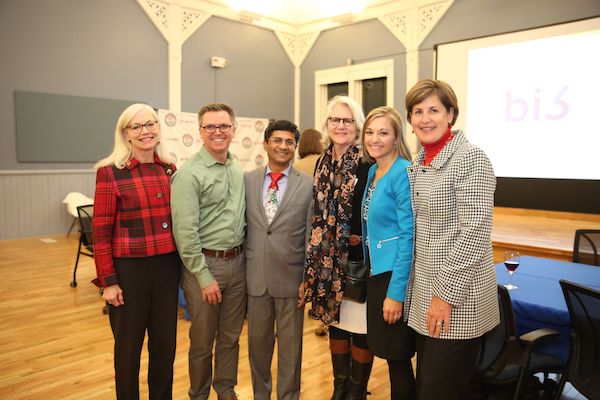Innovative grantmaking program to help transform the region’s health
Today, Bethesda Inc., a major funder of health transformation and cosponsor of TriHealth, announced the launch of bi3, a dedicated grantmaking initiative meant to transform health in the region.
Today, Bethesda Inc., a major funder of health transformation and cosponsor of TriHealth, announced the launch of bi3, a dedicated grantmaking initiative meant to transform health in the region. bi3 will invest in ideas, with the potential to start and scale health innovation. This will result in better overall health for all of Greater Cincinnati’s residents.
“bi3 is the evolution of Bethesda Inc.’s grantmaking work, which builds on our rich history of health-related innovations,” says Mark Holcomb, chairman of Bethesda Inc. “The bi3 initiative better positions us to invest in collaborations and partnerships that lead to breakthrough change in health and healthcare.”
The letters “bi” honor the Bethesda Inc. heritage; the number “3” recognizes that the initiative is built on three core elements — ideas, investments and innovation. It’s not a foundation or a hospital, but the result of a philanthropic investor that wants to help transform the health of the region.
As a cosponsor of TriHealth, Bethesda Inc. and bi3 will be able to create and fund collaborations between TriHealth and community-based organizations. As a result, bi3 will have the ability to scale programs more rapidly, setting it apart from other health-related grants.
The initiative will build upon Bethesda Inc.’s learnings and past successes by focusing on four funding priorities, which represent the top health needs in the community: maternal and infant health; behavioral health; palliative and hospice care; and health innovation that are enabled by new technology or accelerate the integration of care.
Overall, bi3 is particularly interested in efforts that achieve health equity by addressing the social determinants of health and health disparities for underserved populations. In the coming months, bi3 will be flexible in its approach to funding in order to best respond to new opportunities and changes within the community.
As part of the launch, bi3 also announced $3.8 million in funding to TriHealth and local nonprofit organizations. Recipients and program info are below:
- TriHealth in partnership with Hospice of Cincinnati will receive $3.35 million in grant money over three years to launch the first health system-sponsored community-based palliative care program in the region. Once established, the program will relieve physical suffering, manage symptoms, address social needs and support care choices for vulnerable and seriously ill patients and their families. The program, PalliaCare Cincinnati, is expected to provide better care for patients, better health by addressing emotional and phsyical suffering and lower costs from decreased use of acute healthcare services.
- The Center for Addiction Treatment received a $100,000 grant to provide seed money for the start of a primary care clinic and medical resident training program, specifically designed to treat patients suffering from addiction. The clinic will also serve as a training site for TriHealth residents and others in family practices and internal medicine, so residents can learn evidence-based practices for treating addiction as a disease.
- Thanks to a $50,000 grant, TriHealth Behavioral Health will define and deploy a Substance Use Disorder Program that will provide clinical training and patient education on comprehensive treatment options. The program will initially focus on patients facing opioid addiction, and will include links to outpatient treatment upon discharge to help prevent further admissions. This program is in the pilot stage at Good Samaritan Hospital.
- Spry Labs received a $45,000 grant to create a benefit tracker designed for mobile apps, in collaboration with TriHealth. This will allow health system employees a quick, intuitive and convenient way to track time and activities related to delivering community benefit programs. The tracker will also better enable healthcare systems to measure community impact.
- A $100,000 grant will allow St. Vincent DePaul-Cincinnati to complete a consult agreement with Good Samaritan Free Health Center in Price Hill in order to allow immediate patient care services like modifying current drug therapy, starting new therapy, ordering labs and/or physical assessment of patients. The agreement will have the added benefit of providing insight into this community healthcare model and will offer a breakthrough in safety-net healthcare for patients without insurance.















